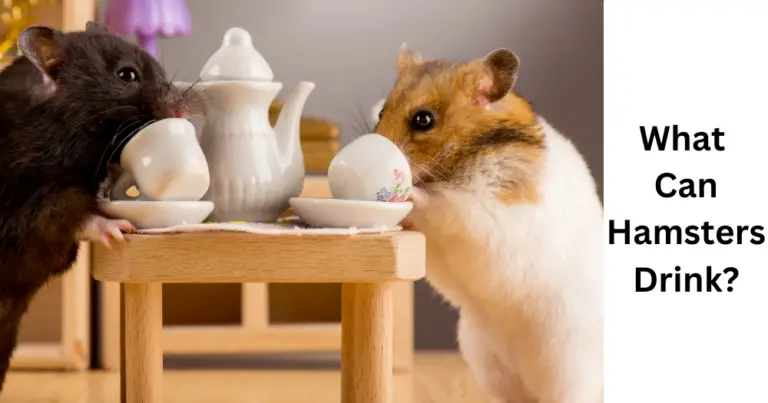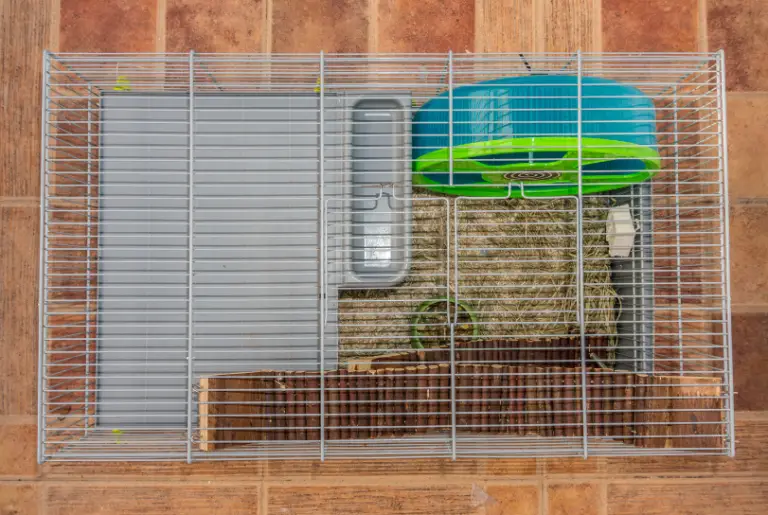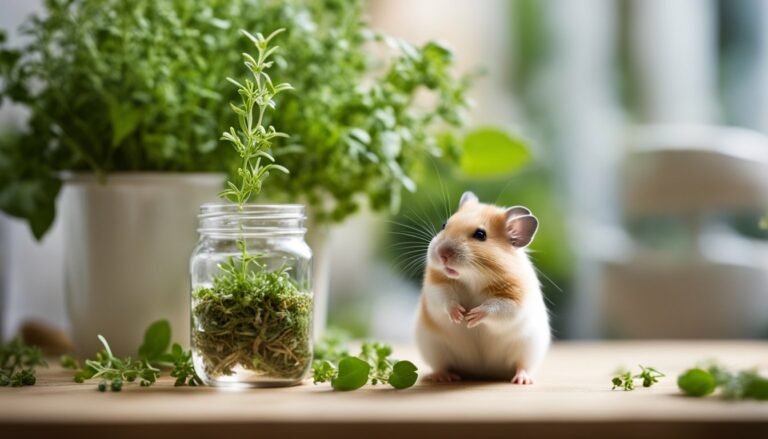Can Hamsters Eat Tomatoes?
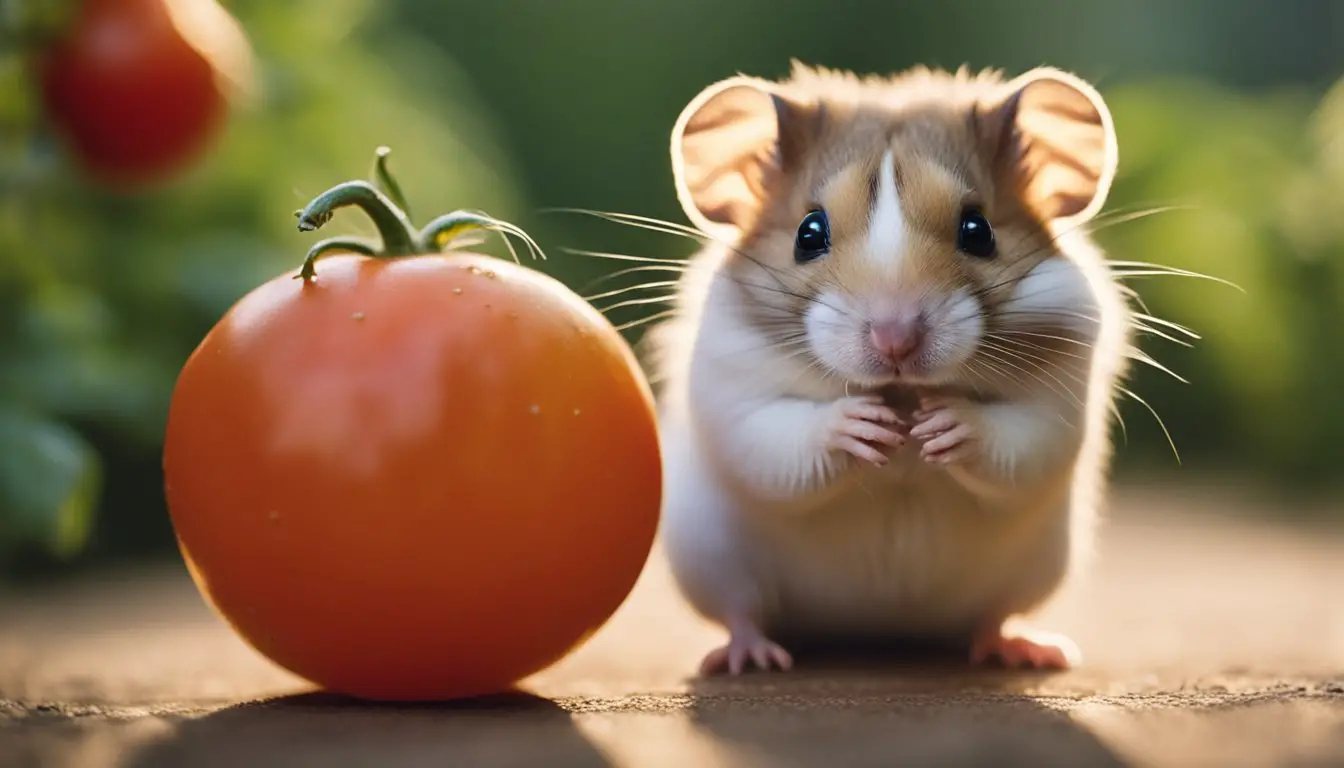
Hamsters are delightful pets, always eager to nibble on a tasty treat. As a hamster owner, you might be curious about adding variety to your pet’s diet, especially when it comes to fruits and vegetables. One common food that raises questions is the humble tomato. Can your hamster safely eat tomatoes, or should they be avoided?
Yes, hamsters can indeed eat tomatoes, but only in moderation. These tiny critters can benefit from the vitamins, minerals, and antioxidants this fruit provides, such as the popular lycopene. However, due to their acidity, tomatoes should be given in small amounts to prevent any digestive issues, such as diarrhea or bloat.
It is crucial to monitor your hamster’s reaction after providing them with this occasional treat, ensuring they remain happy and healthy. So, while tomatoes can make a nice addition to your hamster’s menu, always keep a watchful eye on their intake and well-being.
Contents
Table of Contents
Overview of the Tomato
Description of the Tomato
Tomatoes are popular fruits, though often mistaken for vegetables, that come in various sizes, shapes, and colors. They can range from small and round cherry tomatoes to large and plump beefsteak tomatoes. The color of a ripe tomato is usually bright red, but you may also find yellow, green, and even purple varieties.
When it comes to texture, ripe tomatoes have a slightly firm exterior with a juicy and soft interior. Their taste can vary from sweet to tangy, depending on the type and ripeness of the tomato. It’s crucial to ensure that the tomatoes you feed to your hamster are ripe, as unripe ones can be harmful to their health.
Nutritional Content and Potential Benefits for Hamsters
Tomatoes provide numerous nutritional benefits for both humans and hamsters. They are rich in vitamin C, which promotes strong bones and teeth. Moreover, they contain antioxidants like lycopene that help reduce inflammation. In addition, tomatoes are a good source of vitamin A, which maintains healthy skin and supports vision.
However, it is essential to note that tomatoes should only be given to hamsters in moderation, as they can be too acidic, and their high water content may cause digestive issues. Below is a brief overview of the nutritional content found in tomatoes:
- Vitamin C: Helps support a strong immune system and contributes to overall health.
- Lycopene: A powerful antioxidant that reduces inflammation and protects against oxidative stress.
- Vitamin A: Supports vision, healthy skin, and aids in maintaining a healthy reproductive system.
When it comes to feeding tomatoes to your hamster, always opt for ripe and unseasoned tomatoes, avoiding any added sugars or harmful seasonings. Remember that moderation is key to ensuring a healthy and balanced diet for your furry friend.
Can Hamsters Eat Tomatoes?
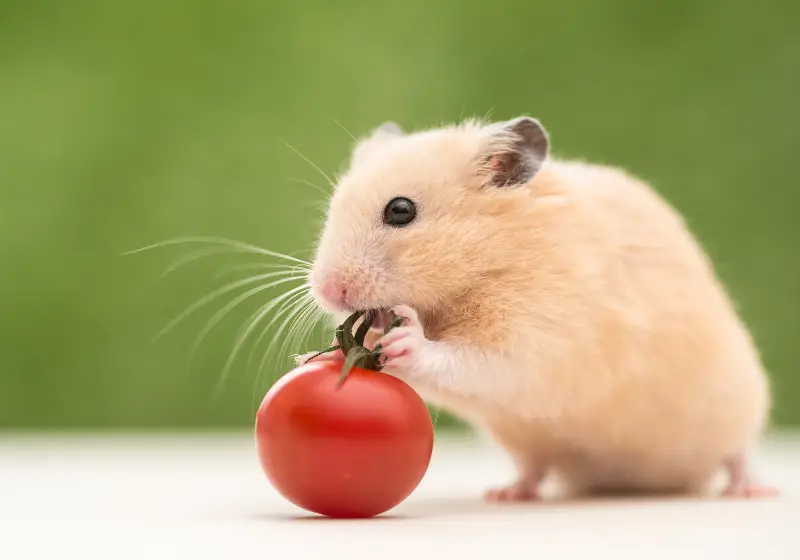
Detailed Analysis
So, you might be wondering if it’s safe to feed your hamster tomatoes as part of their regular diet or as a treat. Hamsters can indeed eat tomatoes, but the key here lies in moderation and knowing which parts of the tomato to feed your furry friend.
It is recommended to feed your hamster only ripe, red tomatoes, and avoid feeding them the green, unripe ones as they may contain tomatine, which can cause gastrointestinal problems such as vomiting and diarrhea. Also, remember to keep the tomato stem and leaves away from your pet, as those parts can be toxic to them.
Health Benefits or Risks
Tomatoes offer some health benefits, like being a good source of vitamins, minerals, and dietary fiber. On the other hand, they are also acidic and contain a considerable amount of sugar. Consuming too much tomato can lead to obesity, dehydration, and diarrhea for your hamster. Consulting with a veterinarian about what’s best for your pet is always a good idea.
Do keep in mind that tomatoes can have pesticide residue on them, so it is essential to wash them thoroughly before feeding them to your hamster. Small pieces of tomato, after proper cleaning, are advisable to avoid any choking hazard.
Occasional Treat or Regular Part of the Diet?
Considering the risks and benefits mentioned above, tomatoes should be given as an occasional treat rather than a daily staple in your hamster’s diet. It is best to limit the tomato intake to a half teaspoon for adult hamsters once a week, while avoiding feeding baby hamsters entirely, as they have much more sensitive gastrointestinal systems.
As tomatoes are high in sugar, moderation is the key here. Balancing your hamster’s diet is crucial; make sure they are also consuming other fruits, vegetables, and hamster pellets for a well-rounded, nutritious meal plan.
In conclusion, tomatoes can be an enjoyable treat for your hamster when given safely and in moderation. Taking the necessary precautions and consulting with a veterinarian when needed ensures your furry friend stays happy and healthy.
Serving Suggestions for Tomatoes
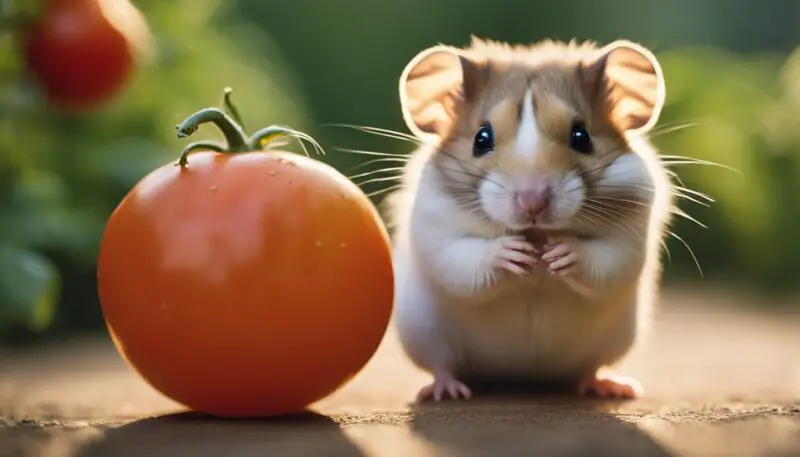
How to Serve Tomatoes
When feeding tomatoes to your pet hamster, always ensure that they are ripe. Unripe tomatoes can be harmful to their digestive system. To serve tomatoes, wash them thoroughly to remove any potential pesticides or dirt. Next, cut the tomato into small pieces that are easy for your hamster to eat.
It’s important to remove the skin of the tomato, as it can be difficult for your pet’s digestive system to break down. Simply slice the skin off the tomato before cutting it into small pieces.
Recommended Portions
Be mindful of portion size when offering tomatoes to your hamster. While tomatoes are a tasty treat, moderation is key to keeping your pet healthy and avoiding obesity. Start by providing just one or two small tomato pieces at a time. Remember that hamsters, especially baby hamsters, have tiny stomachs, so a little bit goes a long way.
Keep an eye on your hamster as they enjoy their tomato treat. If they eat the initial portion without any difficulty or signs of distress, you can provide a bit more.
Feeding Frequency
While tomatoes can be a nice addition to your hamster’s diet, it’s crucial not to overfeed them. Offer tomatoes as an occasional treat, perhaps once a week or less. This will help ensure that your pet doesn’t develop any digestive issues due to the acidity of tomatoes.
Make sure to maintain a balanced diet for your hamster, including their regular food and a variety of other healthy treats. Additionally, always ensure that your hamster has access to clean water to keep them hydrated and support their overall health.
By following these serving suggestions, you’ll be able to provide your pet hamster with a tasty and safe tomato treat. Enjoy!
Alternatives to Tomatoes
If you’re looking to diversify your hamster’s diet and provide them with a variety of tasty treats, there are numerous alternatives to tomatoes. In this section, we’ll explore some suggested alternatives and healthy options besides tomatoes that are both safe and nutritious for your furry friend.
Suggested Alternatives
While tomatoes can be given to hamsters in moderation, there are other fruits and vegetables that are equally nutritious and offer various benefits. Here are some popular alternatives:
- Cucumber: A great source of hydration, cucumbers make for a refreshing treat.
- Carrots: Rich in beta-carotene, carrots provide essential vitamins and minerals. Just give them in small amounts to avoid excess sugar.
- Apples: Adding a tiny bit of apple (without the seeds), provides antioxidants and dietary fiber. Remember to control the portions to manage sugar intake.
- Broccoli: An excellent source of vitamins, minerals, and fiber, but ensure that you give it in moderation to prevent digestive issues.
Healthy Options Besides Tomatoes
Rather than solely focusing on fruits and vegetables, consider incorporating the following food items into your hamster’s diet:
- Pellets: A primary source of nutrition, specially formulated pellets provide a balanced diet, including essential vitamins, minerals, and fiber.
- Blueberries: Given sparingly, blueberries are an excellent antioxidant-rich treat for your hamster.
- Grains: Oats, barley, and millet are suitable grains to include in your pet’s diet occasionally.
- Hay: Timothy hay is essential for your hamster’s dental health, providing necessary roughage and fiber.
- Protein sources: Mealworms, boiled eggs (without seasoning), and cooked lean meats can provide a much-needed protein boost in small amounts.
- Water: Always ensure that your hamster has access to fresh, clean water to keep them healthy and hydrated.
By offering a mix of these healthy alternatives, your hamster will enjoy a varied and nutritionally balanced diet, reducing their reliance on tomatoes as a treat. Remember to introduce new foods gradually and observe your pet’s reactions to ensure a smooth transition.
Frequently Asked Questions
Can hamsters have tomato sauce?
No, it is not recommended for hamsters to have tomato sauce. Commercial tomato sauces often contain high amounts of salt, sugar, and preservatives that can be harmful to your hamster.
What veggies are safe for hamsters?
Hamsters can eat a variety of vegetables such as carrots, broccoli, spinach, and kale. They should be served in moderation and it’s important to ensure they are safe for hamsters before feeding them to your pet. Always introduce new veggies gradually and watch for adverse reactions.
Are peppers okay for hamsters to eat?
Yes, hamsters can eat bell peppers. Make sure to remove the seeds and feed them small pieces of washed bell peppers. Avoid feeding your hamster spicy peppers, as they can cause stomach issues for your pet.
Can hamsters consume grapes?
It is safe for hamsters to eat grapes in moderation. However, grapes contain high levels of sugar, so only feed your hamster a small piece occasionally. Keep in mind that grapes can pose a choking hazard for smaller hamsters, so make sure to cut the grape into smaller pieces before feeding.
Are cherry tomatoes suitable for Syrian hamsters?
Yes, Syrian hamsters can consume cherry tomatoes in moderation. Make sure to remove the stem and leaves, since they can be toxic. Only feed a small portion, as too much tomato can cause digestive issues for your pet.
Which fruits can hamsters eat?
Hamsters can eat a variety of fruits such as apples, bananas, raspberries, and blueberries. Remember to remove any seeds or inedible parts, and feed the fruit in moderation due to their sugar content. Always introduce new fruits gradually and monitor your hamster for any adverse reactions or signs of distress.

